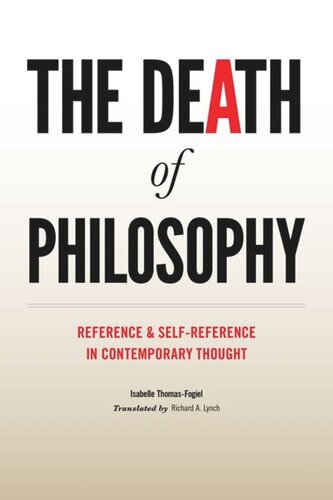

Most ebook files are in PDF format, so you can easily read them using various software such as Foxit Reader or directly on the Google Chrome browser.
Some ebook files are released by publishers in other formats such as .awz, .mobi, .epub, .fb2, etc. You may need to install specific software to read these formats on mobile/PC, such as Calibre.
Please read the tutorial at this link: https://ebookbell.com/faq
We offer FREE conversion to the popular formats you request; however, this may take some time. Therefore, right after payment, please email us, and we will try to provide the service as quickly as possible.
For some exceptional file formats or broken links (if any), please refrain from opening any disputes. Instead, email us first, and we will try to assist within a maximum of 6 hours.
EbookBell Team

0.0
0 reviewsPhilosophers debate the death of philosophy as much as they debate the death of God. Kant claimed responsibility for both philosophy's beginning and end, while Heidegger argued it concluded with Nietzsche. In the twentieth century, figures as diverse as John Austin and Richard Rorty have proclaimed philosophy's end, with some even calling for the advent of "postphilosophy." In an effort to make sense of these conflicting positionswhich often say as much about the philosopher as his subjectIsabelle Thomas-Fogiel undertakes the first systematic treatment of "the end of philosophy," while also recasting the history of western thought itself.
Thomas-Fogiel begins with postphilosophical claims such as scientism, which she reveals to be self-refuting, for they subsume philosophy into the branches of the natural sciences. She discovers similar issues in Rorty's skepticism and strands of continental thought. Revisiting the work of late-nineteenth and early-twentieth-century philosophers, when the split between analytical and continental philosophy began, Thomas-Fogiel finds both traditions followed the same paththe road of referencewhich ultimately led to self-contradiction. This phenomenon, whether valorized or condemned, has been understood as the death of philosophy. Tracing this pattern from Quine to Rorty, from Heidegger to Levinas and Habermas, Thomas-Fogiel reveals the self-contradiction at the core of their claims while also carving an alternative path through self-reference. Trained under the French philosopher Bernard Bourgeois, she remakes philosophy in exciting new ways for the twenty-first century.